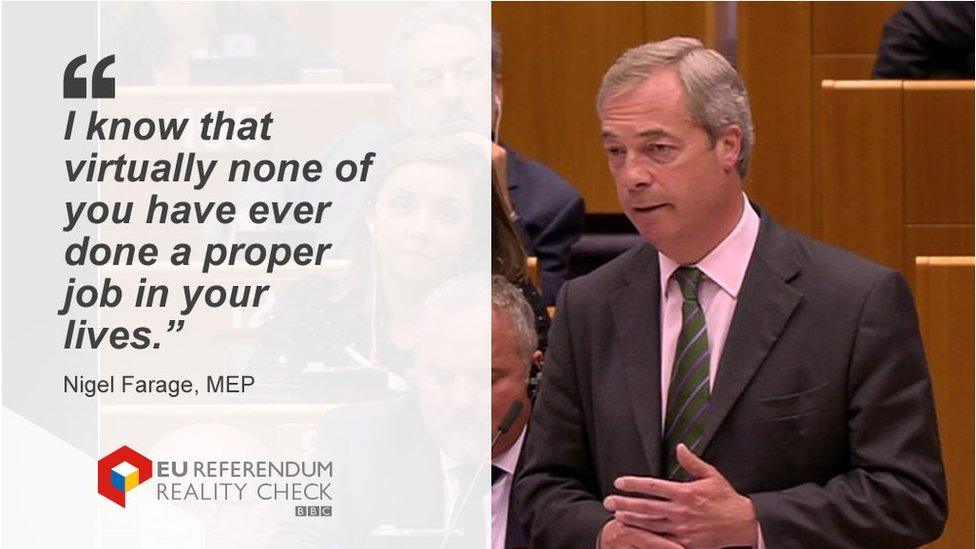Reality Check: Have MEPs done 'proper jobs'?
- Published

The claim: MEPs have not done "proper jobs" that benefit the economy.
Reality Check verdict: It depends on your definition of a "proper job". Of the 14 MEPs who spoke on Tuesday, 13 have spent part of their careers outside politics. Five have worked in business or trade. Of these, four have started their own business, including Nigel Farage MEP.
Speaking at the European Parliament's first debate on the UK's vote to leave the EU, MEP and UKIP leader Nigel Farage told MEPs: "I know that virtually none of you have ever done a proper job in your lives or worked in business or worked in trade or ever created a job."
It was one of many tense exchanges throughout the session, which was marked by booing and shouting. The European Parliament passed a motion urging the UK to start the exit process by triggering Article 50 immediately.
But politics and heckling aside, what do we mean by a proper job? This accusation is usually directed at people who have spent the majority of their working lives in politics, whether as elected politicians, in think tanks, or as civil servants. Mr Farage is talking about people who worked in business and trade.
There are 751 MEPs in the European Parliament - too many to look at it in one article - so we've looked into the previous careers of the 14 who spoke at the session today.
Let's start with Marine Le Pen. She began her political career in 1998 as a regional councillor, but before that she practised as a lawyer for six years. She is trained in criminal law and also worked as the director of the Front National's legal service from 1998 to 2004.
Guy Verhofstadt spent his whole career in politics. He began as a city councillor in 1976 after studying for a law degree. He served as prime minister of Belgium from 1999 to 2008. He has also sat as a Member of the Chamber of Representatives and a Member of the Senate in his home country as well as on a number of company boards.
Martin Schulz, president of the European parliament, is a former bookshop owner. He completed an apprenticeship as a bookseller between 1975 and 1977. In 1982 he opened a bookstore in Wuerselen which he managed for 12 years. In 1987 he was elected as the youngest ever mayor in North Rhine-Westphalia at the age of 31. In 1994 he was elected to the European Parliament (MEP) for the first time.
Alyn Smith graduated from Nottingham Law School in 1996 and taught English in India for a year before qualifying as a commercial lawyer. He worked at a law firm in Edinburgh from 2000, and in 2002 began working for MSP Richard Lochhead at Holyrood as an adviser on European, justice and business policies.
Diane Dodds is an MEP from Northern Ireland. Before that, she was a high school teacher who taught history and English for seven years. In 2003, she was elected to the Northern Ireland Assembly and in 2005, she was elected to Belfast City Council. In 2009, she was elected to the European Parliament.
Gabriele Zimmer worked as a clerk and an editor from 1977 to 1986, then as an assistant in the German SED party until 1989. She was elected to the Thuringia state parliament in Germany in 1990. She became an MEP in 2004.
Philippe Lamberts worked at IBM for over two decades from 1987 to 2009. He first became involved in the Belgian Green party (Ecolo) in 1991 and he was elected as an MEP in 2009.
Ryszard Antoni Legutko has worked as a lecturer at the Jagiellonian University in Krakow, Poland, since 1975. He also edited an underground magazine called Arka in the city in the 1980s. He was elected as an MEP in 2009.
Manfred Weber graduated in engineering in 1996. After graduation he founded a consultancy firm called DG Beratung GmbH consultants (1996-2014) and another consultancy, the G+U GbR company, in 1998. He was a Member of the Bavarian Parliament between 2002 and 2004.
Gianni Pittella held various local and national posts during his career in Italian politics, prior to moving to Brussels. He studied medicine and specialised in forensic pathology. His profile on the EU Parliament website states that he was employed doctor in medicine in the private sector, but only in 1979.
Marcel De Graaff worked as an IT consultant from 1989 after studying theology. He had a brief stint teaching religion at a secondary school in Rotterdam in 2010 before becoming a member of parliament in 2011.
Syed Kamall has been a visiting fellow and lecturer at Leeds University Business School. Prior to that, in 2003, he started a diversity recruitment business, and worked as a consultant at a number of firms from 1997 to 2005. In 2005, he became a member of the European Parliament.
Martina Anderson spent 13 years in prison in England and Ireland before her release as part of the Good Friday Agreement in 1998. She then worked for the Sinn Féin party until 2007 when she was elected to the Northern Irish parliament. She became an MEP in May 2012.
And what about Nigel Farage himself? He's the leader of the United Kingdom Independence Party (UKIP). He became a commodities trader in 1982 and was listed as company secretary for Farage Limited, a commodities broker, until 2011. It is currently in liquidation. The company wasn't big enough to list how many employees it had so we don't have a precise figure for the number of jobs he created.
He joined UKIP in 1993 and became leader in 2006. He was first elected to the European Parliament in 1999, and still holds the post.



- Published22 February 2016

- Published28 June 2016
